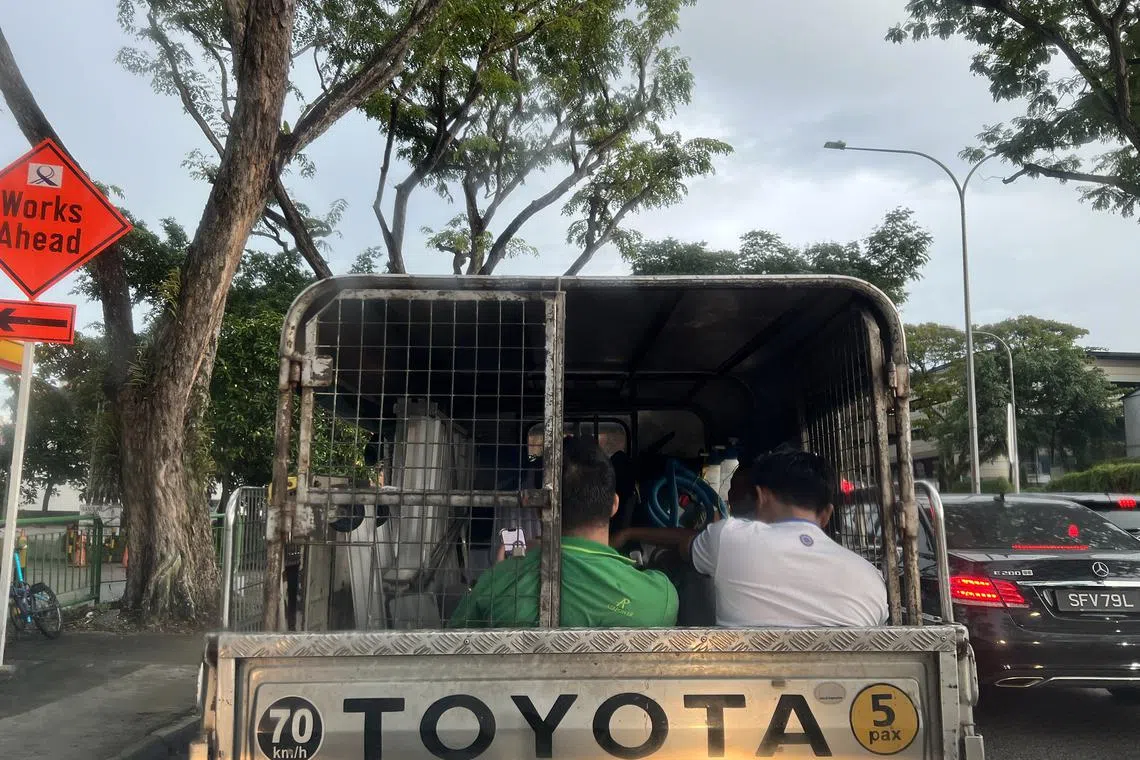MP Louis Ng renews call to ban ferrying workers on lorries; asks for a timeline to be set
Sign up now: Get ST's newsletters delivered to your inbox

Travelling on the back of lorries is banned unless those being ferried are employed by the vehicle owner or hirer.
ST PHOTO: ALPHONSUS CHERN
Follow topic:
SINGAPORE - Mr Louis Ng (Nee Soon GRC) has renewed a call in Parliament to ban the use of lorries to transport workers
Speaking on the matter at the end of Wednesday’s sitting, Mr Ng said it is “unusual, unreasonable and unsafe” that a “business purpose” exception has been carved out.
Travelling in the back of lorries is banned under the Road Traffic Act unless those being ferried are employed by the vehicle owner or hirer. The other exception is in the case of medical emergencies.
Mr Ng said there should be a clear rule across the board that, for safety reasons, no passengers should be allowed to be transported in the back of lorries, and a target year should be set to achieve this if it cannot be done right away.
“This is not a radical step,” he said. “Setting a target year will also give the industry certainty and help build organic, industry-driven solutions
The issue of transporting workers in the back of lorries has been raised by MPs for more than two decades now. In 2000, Nominated MP Gerard Ee asked if the Government would consider a ban.
In 2021, the matter was brought into sharper focus
In response, the authorities said then that changing the rules on worker transport would cause “acute pain” to the construction industry,
It was noted that steps taken over the years, such as mandating canopies and higher side railings, had contributed to a decrease in the number of people injured or killed while on board lorries between 2011 and 2020.
Further steps
To further address concerns about fatigue, workers who also drive lorries are now required to get at least half an hour of rest before driving if they have worked six hours or more prior to that. Additionally, employers must designate a “vehicle buddy” who will sit in the lorry cabin to check if the driver is fit to drive and remains alert.
Lorry drivers are already disallowed from working more than 12 hours a day, including overtime, driving and any other work activities. The mandatory installation of speed limiters
Mr Ng on Wednesday commended the steps already taken, but said a downward trend in injuries and deaths does not mean they have stopped happening.
He noted how the Government had set aside $35 million to help retrofit all school buses here with seat belts after the death of an eight-year-old pupil in 2008, with the Land Transport Authority (LTA) appointing workshops to conduct the retrofitting and provide replacement buses if needed.
“For our schoolchildren, one death in 2008 was enough to catalyse an industry-wide change. We know that deaths or injuries will occur every year for our workers who are transported on the back of lorries. Why do we tolerate this?” he asked.
Mr Ng argued that while the Ministry of Transport has raised valid considerations as to why it is not feasible to install seat belts in the back of lorries or use other forms of transport for workers, the real trade-off is people’s lives and injuries that could lead to permanent disability.
Hence, while a full transition to using buses instead of lorries to ferry workers is estimated to require double or triple the number of private buses currently available, this cannot be an excuse when people will continue to die and get injured, he said.
He suggested that the Government step in to trial the use of buses to transport workers for the larger construction companies as a “realistic interim step”, pointing to successful private sector efforts
“We may not be able to immediately fully transition to bus transport for all workers, but a pilot like this is one step in the right direction; and the funding and coordination by the Government will help the workers and companies significantly,” Mr Ng added.
The MP recommended two other interim measures for the authorities to consider. One is for all companies to have designated drivers, whose only duty is to ferry workers. The authorities should also, at the very least, look to reduce the maximum working hours in a day allowed for lorry drivers, as this can go some way towards reducing the risk of accidents.
He added: “All I’m asking is that we treat our workers with the same care that we do for our children and soldiers... The reality is that none of us sitting here would like to be transported in the back of a lorry.”
In response, Senior Minister of State for Transport Amy Khor said the Government is equally concerned about improving the safety of worker transport.
The authorities have acknowledged that it is not ideal for lorries to carry workers in their rear decks, but simply banning this is not realistic, as the practice cuts across industries and companies of varying sizes.
“Setting a timeline without understanding the varied concerns of all stakeholders is also not meaningful or workable,” she added.
Dr Khor said a wider shift to mandating the use of buses will likely exacerbate an existing shortage of bus drivers
Hence, the authorities take a different approach by looking at specific sectors, engaging companies that can shift to using buses, and seeing how to scale up adoption.
“Industry will be best placed to spearhead this effort as they best understand the ground needs and challenges,” Dr Khor added.


